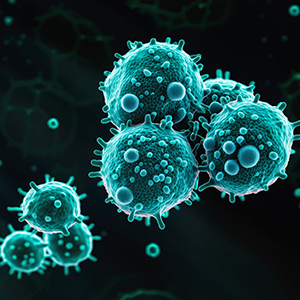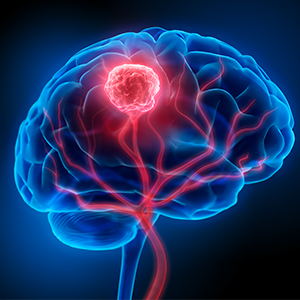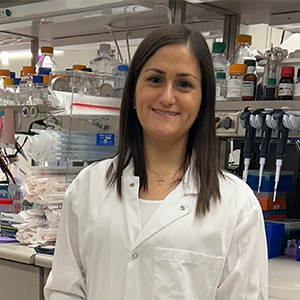-
Science Saturday: Conquering cancer by targeting its genetic abnormalities

Joanne Garnett has harrowing memories of that life-changing day back in 1981. She was a 39-year-old land use planner living in Wyoming when she received a call from her doctor confirming she had uterine cancer.
“I was shocked, and it was strange because I didn’t fit any profile for uterine cancer,” Garnett recalls. “I got a complete hysterectomy, and I figured, well, that’s that.”
But it was just the beginning. A decade later she was struck with stage 2 colon cancer, then kidney cancer.
“I underwent chemo and radiation, had a portion of my colon removed, then I lost my right kidney, and I thought, 'Who has this kind of luck?'” she says.
As an adoptee, Garnett was not aware of her family medical history or the hereditary genetic mutation lurking deep within her DNA. The discovery came from a simple blood test.
“I got the results back and it showed, yes, indeed, I had one of the four types of the genetic defect that is Lynch syndrome,” she says.
Lynch syndrome is a cluster of inherited mutations that increases the risk of several cancers, including colorectal, kidney and uterine cancers. It generally strikes before the age of 50. It’s caused by changes to genes that affect DNA mismatch repair — a process that fixes mistakes when DNA is copied. These genes normally protect a person from getting certain cancers, but mutations prevent the genes from working properly.
Discouraged, yet determined, Garnett made an appointment with Niloy Jewel Samadder, M.D., a gastroenterologist and cancer genetics expert with Mayo Clinic Center for Individualized Medicine in Arizona.
“He helped me realize it is a gift that I know that I have Lynch syndrome because now I know what I need to do in order to stay in front of it as much as possible,” says Garnett. “It’s his level of care and diligence and attention that brings me peace at night.”

To stay ahead of any potential cancers, Garnett undergoes regular screenings, including annual endoscopies, colonoscopies, mammograms and urology exams, as well as biannual dermatology checks.
“A normal person goes in for a colonoscopy once every five to 10 years. If I did that, I’d be dead,” Garnett says. “Because every time I have a colonoscopy, we are still knocking off polyps that are in the throes of turning malignant.”
Garnett says this is why she uses every opportunity to share her experience and encourage others to get genetic testing.
“He helped me realize it is a gift that I know that I have Lynch syndrome because now I know what I need to do in order to stay in front of it as much as possible.” - Joanne Garnett.
“Some say, ‘Oh, I don’t want to know.’ And I think, well, you’re nuts because knowledge is power, and you can stay ahead of this,” says Garnett, who enjoys traveling overseas to Africa and volunteering to help children with AIDS. “You just get on that horse and you ride, and Dr. Samadder has always steered me accurately and with excellent care.”
Ushering in new era of genetic screening
Dr. Samadder is leading efforts at Mayo Clinic to usher in a new era of genetic screening and detection that focuses on identifying hereditary cancers. His team in Mayo Clinic's Center for Individualized Medicine recently conducted a two-year study, called Interrogating Cancer Etiology Using Proactive Genetic Testing (INTERCEPT), offering free genetic testing to nearly 3,000 patients who were diagnosed with cancer at Mayo Clinic Cancer Centers. In all, the researchers found that 1 in 8 patients with cancer had an inherited cancer-related gene mutation. This mutation would not have been detected in half of these patients using a standard guideline-based approach.
Dr. Samadder says Lynch syndrome was one of the most frequent genetic syndromes identified in the INTERCEPT study, with nearly 1 in 100 patients with cancer having this diagnosis.
“Cancers that are due to Lynch syndrome are different from their ‘sporadic’ counterparts in being highly immunogenic and showing genomic instability,” Dr. Samadder explains. “This led to many of these patients being offered access to unique therapies, such as immunotherapy that is highly effective in the treatment of these cancers and can improve the patient’s survival.”
Genetic tests vital in hereditary breast cancer treatments
Kate Lew, 37, suspected she had a genetic abnormality in her DNA after she found out that her father, who had been diagnosed with prostate cancer, carried the BRCA2 gene. The inherited mutation significantly raises a person’s lifetime risk of developing breast, ovarian, prostate and other types of cancer.
Lew’s grandmother and aunt on her father’s side of the family also had a history of breast cancer, and were confirmed to carry the same hereditary genetic mutation.
“My husband and I were thinking about family planning, and I just wanted to know,” Lew says.
Lew went to Mayo Clinic for a genetic test, which confirmed she carried the BRCA2 gene. Soon after, her initial baseline breast MRI detected breast cancer.

“The MRI test discovered not only breast cancer, but I also had metastasis to my sternum. So I had what was considered stage 4 cancer,” says Lew, a nurse practitioner with the Mayo Clinic Cardiology Department in Arizona.
Lew’s aggressive treatments have included chemotherapy and radiation, a bilateral mastectomy and the removal of her ovaries, as a precaution to prevent the development of a new cancer.
“I benefited from genetic testing because had I not gone for the genetic testing when I did and then for the screening test based on those results, my cancer likely would not have been found until much later and with a worse prognosis,” Lew says. “I think that having my genetic test results helped to inform my decisions about the surgeries I had.”
Breast cancer genetic mutations common in other cancers
Dr. Samadder’s INTERCEPT study revealed mutations like Lew’s, in the high risk BRCA1 and BRCA2 breast cancer genes, accounted for nearly 17% of all genetic mutations found in patients with cancer.
“More interesting was the fact that even though these genes are classically associated with breast and ovarian cancer, they occurred at an even higher frequency in pancreatic and prostate cancers,” Dr. Samadder explains. “These are not cancers we typically think of as being highly genetic, but our finding of BRCA mutations in these cancers opens up possibilities of using alternative cancer treatments for these patients as well,” he says.
“I benefited from genetic testing because had I not gone for the genetic testing when I did and then for the screening test based on those results, my cancer likely would not have been found until much later and with a worse prognosis.” - Kate Lew
Two-and-a-half years after her diagnosis, Lew is thankful to be in remission. She enjoys spending time with her husband and dogs, as well as cooking and working on projects around her house. She is urging others with a family cancer history to undergo genetic testing.
“Oftentimes we think of breast cancer as being connected to your mom and your mom’s history,” Lew says. “But, of course, in my case, this was from my dad’s side. So realizing that there may be more connections is really important to know.”
She says her experience has also helped her to see through the eyes of her patients.
“I think having the knowledge of what people are going through when you’re waiting to hear the results or going through tests has helped me see things from a patient’s perspective.”
Dr. Samadder says Lew, Garnett and other patients like them are powerful examples of why genetic testing is essential.
“Genetic testing is critical for early detection of cancer when many are still treatable and can also lead to important decisions regarding targeted therapies that can shrink the tumor and improve survival," he says.
Learn more
Read more stories about advances in individualized medicine.
Register to get weekly updates from the Mayo Clinic Center for Individualized Medicine blog.
Join the conversation
For more information on the Mayo Clinic Center for Individualized Medicine, visit Facebook, LinkedIn or Twitter at @MayoClinicCIM.
Related Articles







